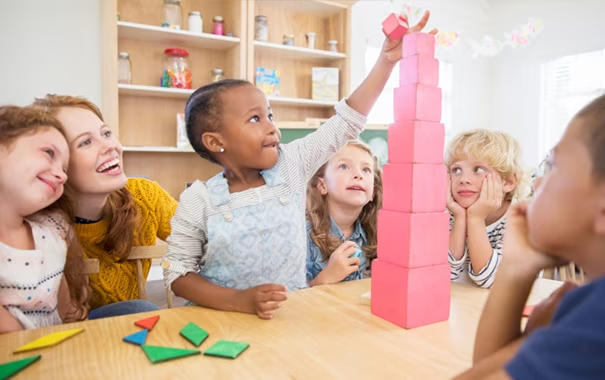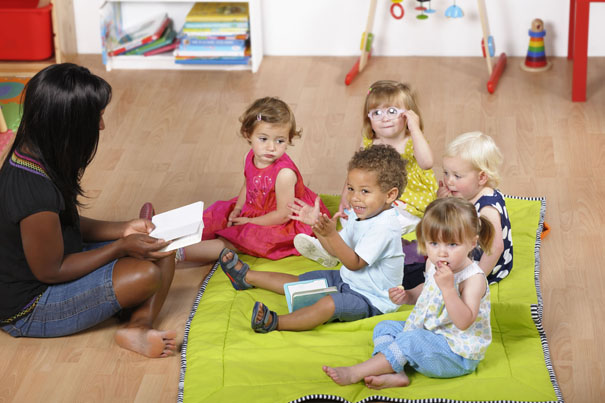Key Takeaways
Most children are ready for preschool around age 3, when they can benefit from social interaction, structure, and play-based learning.
The best preschools nurture independence, confidence, and curiosity—not early academics. Look for programs that emphasize exploration and child-led activities.
Visit and compare multiple schools. Ask about their philosophy, staff credentials, class sizes, and policies. Talk to current and former families.
Look for qualified, consistent staff and a safe, engaging environment with clear routines and age-appropriate expectations.
Ask practical questions about hours, costs, discipline approach, potty training support, parent involvement, and accreditation.
A smooth preschool transition starts with confidence at home—your child’s growth is supported by the trust you’ve built together.
By the time children are 3, they are usually ready for a regular experience outside the home with other children and adults. It's time to consider preschool. Preschool is defined technically as a program for 2- to 5-year-olds, offering some structured activities and run by a teacher with specialized training in early-childhood development. The line between preschool and a center-based day care program is blurry. But generally speaking, most kids are ready for a shift at about age 3 to a larger and somewhat more structured experience.
Independence and Social Skills
The goals of preschool are to give a child a sense of independence away from home, to teach her to negotiate relationships with other children, and to encourage her to interact with adults outside the family. Although social skills are the main focus, a good preschool also offers new things to explore and the chance to learn in a group setting. Parents should see their child growing in social skills, independence, and maturity, and developing an excitement about learning and discovery.
How to Choose a Good Preschool
Good preschools allow a child a lot of freedom to explore different activities; they encourage a sense of excitement with discovery and offer a child-centered experience. Those that push "academic skills" and are largely teacher-directed only dampen motivation for learning. These schools aren't very successful since preschoolers aren't ready for formal training in reading and writing at this stage. Good-quality preschool enhances development, self-confidence, and self-regulation. Focus your preschool selection on a school that has these attributes and where you and your child are comfortable.
Gather Some Intel
You might need several visits to various preschools before you can be sure of the right placement for your child and for you. See if you are comfortable with the philosophy, the approach, the policies, and the personnel, particularly the director of the school. You should also gather some specifics. It would be good to get references, but not just from happy parents: get in touch with those who have left the program to find out why.
Take the following into consideration as you check out different preschools:
Small class size. Two- and 3-year-olds should be in groups of fewer than eight children. Four-year-olds can be in larger groups if there is an aide to assist the teacher. A teacher/student ratio of 1:7 is best at these young ages.
Special training. Teachers should have specialized training in early-childhood development, and the director should have a bachelor's or master's degree in this area.
Stability. Good centers retain teachers, so ask about turnover. Turnover of more than 33 percent per year usually means something isn't right, in pay or morale or both. If a teacher is replaced every six months, you may want to find out why.
Safety. In a good preschool the classroom and the play area meet all applicable health and safety guidelines. Watch the kids while they play inside and outdoors to see if there are any hazards.
Structure. Ideally the teacher will have a teaching plan so she is presenting learning and exploring opportunities in some kind of sequence, building on seasonal ideas and offering activities for a range of skill levels. There should be a daily schedule, which you should be able to examine. There also should be school policies for handling emergencies and for evaluating each child's adjustment and progress.
Social climate. Consider how it would feel to be a child at this school. Watch how the teacher helps kids through the tough transition at the start of the day. Observe how discipline is handled. Notice if it follows your own approach, or if it strikes you as too permissive or too severe. See how arguments and fights between kids are handled. These are inevitable and can be learning experiences if the teacher gives the children ways to handle their problems and disagreements. Watch how a sad or withdrawn child is managed. The approach here should be gentle and kind, aimed at keeping the child comfortable but also drawing him into group activities. The noisy and/or involved kids shouldn't be the only ones getting the attention.
Questions to Ask
Are parents allowed to drop in and observe at any time? They should be, no question about it.
Is the center licensed? This is a minimum requirement. Most good centers will also have certification from a national or state accrediting association.
What are the payment options? Can you donate time to offset some costs? What are the late fees? Can you get a discount by paying in advance?
What are the hours? Are there extended-day options? If so, what happens during that time and who supervises? What is the extra cost?
What happens if you are late for a pickup?
What about toilet training? When a child has an accident, how is it handled?
What is expected of you in the way of volunteer time? Will you be asked to contribute snacks, supplies, or lunches on a regular basis?
It can be tough to see your little one start to have experiences in a world separate from your own, and inevitably you will feel some sense of displacement. But if your child is able to participate and enjoy a preschool experience, it's because you've given her the love, support, and confidence to take the next step. A little separation will be good for you both and enriching for her.






